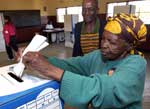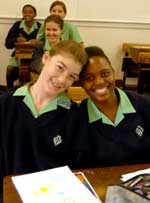South Africa is a much better place to live in now
What does 20 Years of Freedom mean
Documents
Related links
In 2014 South Africa celebrates 20 Years of Freedom and democracy. This momentous occasion presents an opportunity for us to reflect on how our freedom and democracy were achieved; the progress we have made the past 20 years; and on how South Africans will work together to implement Vision 2030.
- Our Constitution lays the basis for the construction of a democratic, non-racial, non-sexist, united and prosperous society based on justice, equality, the rule of law and the inalienable human rights of all.
 One of the symbolic moments of the exodus from the past was the raising of the new flag in 1994. This moment aptly affirmed the pride and dignity of an unfolding country and a celebration of humanity.
One of the symbolic moments of the exodus from the past was the raising of the new flag in 1994. This moment aptly affirmed the pride and dignity of an unfolding country and a celebration of humanity.
- Another significant moment was the merger of Nkosi Sikelel' iAfrika and “Die Stem” to form one national anthem in 1997.
- On 27 April 2000 the new Coat of Arms was launched embracing the collective historical essence of the people of the country.
Government encourages every sector of society to reflect on the progress made and the challenges that the nation has faced over the past 20 years.
The celebrations will strengthen relations with other African countries and the world. In 2013 the African continent celebrated the 50th anniversary of the Organisation of African Unity (OAU). We remain grateful to the continent and the international community for supporting us in the struggle for liberation.
We must never forget that our democratic birth was rightly hailed as a miracle. Doomsayers and those who wanted us to fail had predicted chaos and civil war. However, none of these things came to pass and the values of democracy and freedom of our birth still endure today.
South Africa has abandoned its shameful past and has steadily moved towards building a new culture based on respect of human rights and dignity.
Compared to before 1994 we can proudly proclaim that millions of people now have water, electricity, sanitation and housing. By our own standards, we declare that this is not good enough; that we must not rest until all the people can claim a better life.
The release of the Census 2011 figures shows a definitive picture of a country that is rapidly changing. The figures paint the picture of a country that has increased income levels, an improvement in the roll-out of basic services and amenities, and increased levels of education.
While celebrating our achievements we must also look forward to the next 20 years.
The National Development Plan (NDP) is our roadmap. The plan outlines the type of society we are striving for in 2030, where no one is hungry, where everyone is able to go to school and further their studies if they wish, where work is available, where everyone is making a contribution because each person has been provided with what they need to reach their full potential.
South Africa is a much better place to live in now
Read more about the way life has changed in South Africa: South Africa is a much better place to live in now.
What does 20 Years of Freedom mean?
As the nation prepares to celebrate 20 Years of Freedom many people will no doubt ponder what freedom means? Some will point to our maturing democracy which entrenches the rights of all as evidence of our freedom. Others may highlight important issues like freedom of speech, or human dignity.
As we focus on the benefits of freedom we should also reflect on the strides we have made in achieving the vision of a better life for all. Much has changed since 1994 and there has been progress in every sphere of society, but we are aware that more must still be done.
Although challenges remain there are more things that unite us as South Africans than push us apart. As a collective we should all take pride in what we have achieved as a nation and push ahead as we together continue to build on the progress we have made.
The findings from the GCIS National Quantitative Tracking Study Quarter 3 (July – September) 2013 offer fascinating insight into the views of ordinary South Africans on the meaning of freedom.
The public’s response in regard to celebrating our 20 Years of Democracy [Freedom] in 2014 was overwhelmingly positive. Reasons stated pertain to our freedom and democracy, and our unity as a nation. Those who opposed the idea did so mainly because they believe that there has been little change or improvement, and that there is still inequality in South Africa.
The major achievements of our 20 Years of Democracy [Freedom] are seen to be freedom, democracy and peace. Other achievements include improvements in education, house and housing subsidies for those who need it, more racial equality and access to basic services.
The right to universal suffrage (the right to vote) is entrenched. 
- The right to vote which was denied a large part of South Africa's population for so long under apartheid has come to symbolise our freedom and the new society we are building.
- We should never forget the sacrifices of countless patriots who fought tirelessly so that all people in South Africa are free and allowed to vote for a party of their choice.
- Citizens have the right to vote for and choose public representatives in regular national, provincial and municipal elections.
- Elections give the public a direct say in how the country should be run.
- Elections are free and fair and based on the will of the people.
- The Independent Electoral Commission has an unblemished track record in ensuring free and fair elections.
We must continue to strive for a better life for all. 
- Society has been transformed since 1994, income levels have increased, education levels are up and many millions of people now have access to water, electricity, sanitation and housing.
- We have not allowed our divided past to shape our future.
- Together we have built a new society on the values of a united, non-racial, non-sexist and democratic South Africa.
- It is our shared responsibility to continue building a strong and caring nation.
We must build on our freedom and democracy.
- The Constitution is the foundation of our democracy, the very essence of what freedom means is defined in the Constitution.
- The Preamble of the Constitution refers to a democratic and open society in which government is based on the will of the people and every citizen is equally protected by law.
- The Bill of Rights reaffirms that everyone has inherent dignity and the right to have their dignity respected and protected.
- It refers to the right to freedom of conscience, religion, thought, belief and opinion. It includes the right of freedom of expression and freedom of association.
- We must continue to strengthen the freedoms and protections we enjoy.
South Africans enjoy the freedom to choose. 
- Under apartheid the right to choose and freedom of movement and association was denied for the majority.
- People were forced to live in racially divided communities which served to enforce a culture of oppression.
- We have moved decisively from a repressive regime to a society built on the values of human rights, human dignity and democracy.
- The right to choose which was denied for so long has come to define the new society we are building.
We must continue to break down barriers which divide us.
- For the first few years of our freedom the democratically elected government repealed apartheid laws and prescripts.
- Discrimination became the norm in the early 1800’s when Pass documents were used to restrict the movement of non-European South Africans.
- The promulgation of the 1913 Natives Land Act saw people removed from their land and families torn apart.
- The repeal of apartheid laws that sought to restrict the freedoms and aspirations of black people finally brought about human dignity following centuries of oppression.
- The repeal of the Population Registration Act of 1950 which formalised racial classification was a major step on our journey to freedom.
- The repeal of hated laws such as the Group Areas Act of 1950, which decreed that only people of the same race could live side by side, the repeal of the Prohibition of Mixed Marriages Act of 1949, which prohibited marriage between persons of different races were all major steps on our journey to democracy.
- We broke down the artificial barriers that divided us so that all in society could enjoy the benefits of freedom.
- This generation must continue to work towards a society free from racial, economic and class barriers.
- The triple threat of poverty, unemployment and inequality is a barrier that must be breached so that all South Africans may enjoy a better life.
What does 20 Years of Freedom mean to you? Share your story and pictures with 20YOF on Facebook or tweet to @20_yof.
Documents
- Twenty Year Review, 11 March 2014
- Development Indicators 2012, 20 August 2013
- Towards a Fifteen Year Review [PDF], 1 October 2008
- Towards a 10 year review: Synthesis report on implementation of government programmes: Discussion document [PDF], 1 October 2003 (Note: Some facts in this report were updated and published in the South Africa Yearbook 2004/05 Chapter 3 - Overview [PDF].)
- Guidelines on the use of the 20 Years of Freedom logo [PDF]




